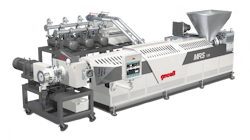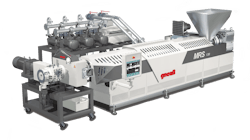To better handle highly contaminated post-consumer PET, Gneuss has beefed up the drive on its Gneuss Processing Units (GPUs), the company’s high-performance extrusion lines. The upgraded GPUs will debut at K 2019.
The GPU on display will comprise a Multi- Rotation System extruder, the MRS 110; an RSFgenius 90 fully automatic melt-filtration system; and a new, in-line VIS viscometer. It is designed to process 1,300 pounds per hour of undried and uncrystallized PET.
However, the latest GPU extrusion line features a second-generation MRS extruder with an enhanced drive that is more robust to handle mixed plastics and materials with higher levels of contamination and moisture.
“We are using a different style gear box with an integrated motor, which is more energy- efficient and more robust,” said Monika Gneuss, VP of sales and marketing manager. “Generally speaking, our customers are telling us that recycling material quality is going down. Companies want to recycle material that in the past would have been discarded, so, all in all, these processes are more demanding.”
In addition, several changes to the design of the extruder’s drum and screw allow it to better retain the intrinsic viscosity (IV) of the resin. However, Gneuss said exact details of the changes are confidential.
“The higher the IV, the more valuable the material [in general],” Gneuss said.
The company upgraded the controller, which now has a larger, 22-inch screen and programming logic that provides an intuitive operator experience, Gneuss said. The controller offers illustrations and simpler navigation.
The MRS extruder uses a simple water ring vacuum system to create the required vacuum for the devolatilizing. It features a drum section with eight satellite single screws driven by a ring gear and pinion transmission. The barrels are approximately 30 percent open for optimum exposure of the melt. This results in devolatilizing that is 50 times greater than that of a conventional single-screw extruder and with a vacuum of only 25 millibar to 40 millibar, according to the company. This eliminates the need for pre-drying or a deep-vacuum system.
The MRS extruder can process recycled PET with a moisture content of up to 1 percent and is economical because a deep vacuum system and pre-drying are unnecessary.
The MRS 110 that will be displayed at K 2019 features a 110mm-diameter screw. MRS extruders also are available with screw diameters of 35mm, 50mm, 70mm, 90mm, 110mm, 130mm, 160mm and 200mm.
The advantages of the extruders include their ruggedness, small footprint, ease of operation and processing flexibility, Gneuss said. They have minimal maintenance requirements.
The U.S. Food and Drug Administration issued a letter of non-objection confirming the decontamination efficacy of the GPU technology for applications in which recycled plastic comes into contact with food.
GPUs are particularly well-suited for PET sheet extrusion, according to Gneuss. The line at K 2019 will be delivered to a customer in Brazil after the show for processing recycled PET into packaging sheet.
Bruce Geiselman, senior staff reporter
Contact:
Gneuss Inc. Matthews, N.C., 704-841-7251,
About the Author
Bruce Geiselman
Senior Staff Reporter Bruce Geiselman covers extrusion, blow molding, additive manufacturing, automation and end markets including automotive and packaging. He also writes features, including In Other Words and Problem Solved, for Plastics Machinery & Manufacturing, Plastics Recycling and The Journal of Blow Molding. He has extensive experience in daily and magazine journalism.

